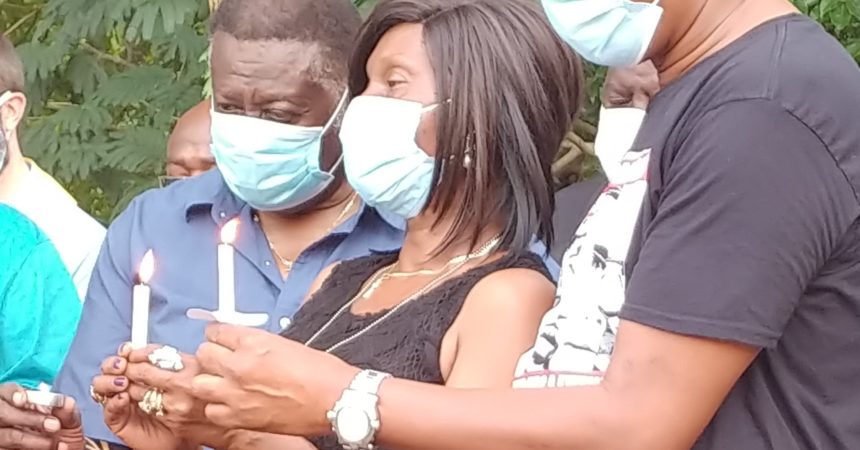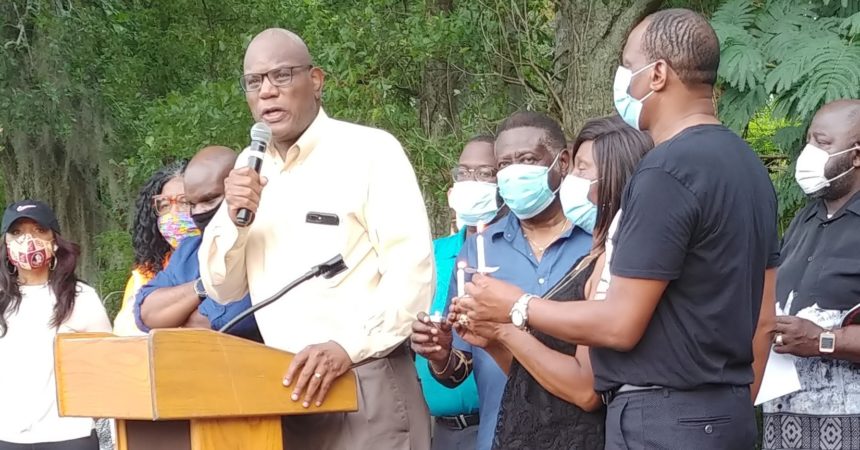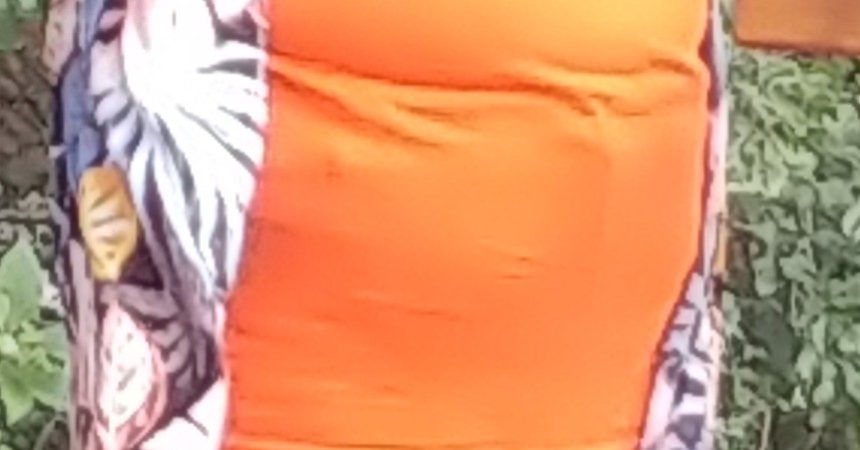Blacks, Whites come together to make call for change
One by one speaker used their individual speeches to call for an end to racial injustices, including questionable police action.
A crowd of about 200 stood on an opened field at Walker/Ford Community Center and listened. Intently. Some shook their heads in agreement while others had a stoic look on their faces.
They were called together by the Greater Bond Neighborhood Association to air issues that have had the community under the microscope for the last two weeks. At the top of the list are two shootings and a stabbing that resulted in death.
From law enforcement to mental health professionals they were there to talk about how their coming together could be a start to solving problems in the community. Members of the clergy and representatives of business organizations also showed up for the candle light vigil.
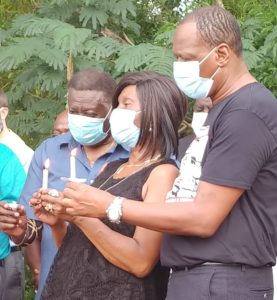
Wanda McDade (center) was among the participants in a call to action prayer vigil held last Friday at Walker/Ford Community Center. Her daughter, Natosha “Tony” McDade was killed in a police-involved shooting.
Photo by St. Clair Murraine
“In my 20 years as president, I’ve never seen this moment in Tallahassee,” said Sue Dick, president of the Tallahassee Chamber of Commerce. “We’ve got to change the way we do things and I think that’s what this has to be about. It can’t be just up to the community to do. It’s going to take everybody.”
Providing economic opportunities for people who live in the predominantly Black neighborhood would bring about some change, she said. Katrina Tuggerson, president of the Capital City Chamber of Commerce, said the event could kick start change that goes beyond the community.
“It’s just time for a change,” she said. “We define the moment so by defining the moment we can go either positive or negative. I think Tallahassee has chosen to go positive with this and make things happen.”
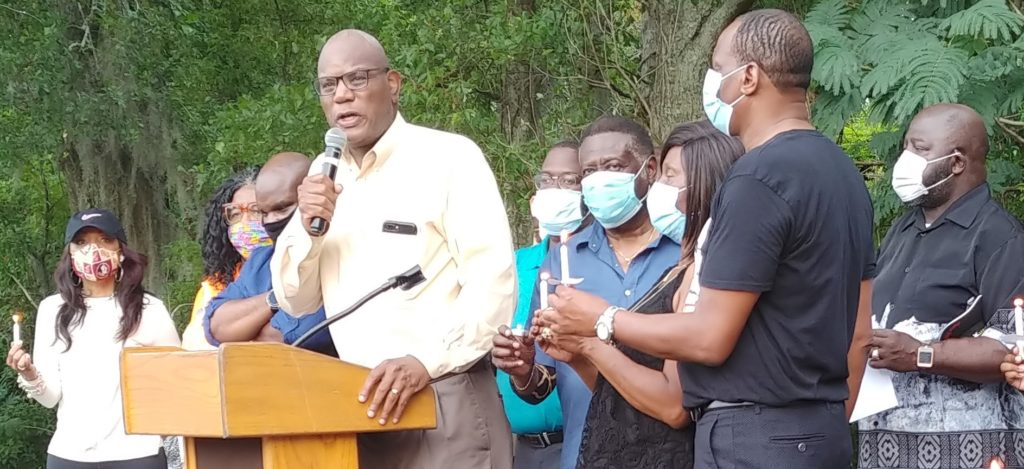
Rev. RB Holmes (center) expressed astonishment over mix of races at last Friday night’s call to action prayer Vigil. Photos by St. Clair Murraine
The gathering drew a cross-section of Blacks and Whites for what organizers called an event to start the healing and a call to action for change. Several of the speakers, including Rev. RB Holmes, referenced the killing of George Floyd by a former Minneapolis officer and the death of Latosha “Tony” McDade, who was shot in a police involved killing.
“Blacks and Whites have come together because they are tied of somebody’s knee on somebody’s neck,” Holmes said, referencing the Floyd incident before leading a candle lit prayer. “They are tired of Black men and Black women being unarmed and dying.
“I’ve been around a long time, but I’ve never seen so many White people standing with Black people.”
Earlier in the day, protesters were down town stating their demands, including getting answers to police involved-shootings in the city.
“These things make us tired and they fatigue us individually, but collectively we will keep moving forward,” said Talethia Edwards, president of the Greater Bond Neighborhood Association. “Today I chose hopefulness over being tired. I choose to look forward, but how do we move forward?”
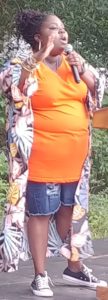
Talihina Edwards, president of the Greater Bond Neighborhood Association, asked the crowd at a call to action vigil to call out their concerns over race relations.
Edwards encouraged the crowd to “name your hurt.” Before going through a list of things that are causing some of the pain in her neighborhood, she said, “You have to call it out and identify it.”
Some of the things she insisted needed to be brought to light include racism, prejudice, injustice along with implicit bias and institutional racism. Before leaving the stage, Edwards announced some of the concerns that her community wanted to act on. They include law enforcement, government and community.
Edward also announced that she and others will form the Tallahassee Collective to confront racial issues. The organization will have a virtual meeting on Zoom June 29, beginning at 6:30 p.m.
Mayor John Dailey and his family were there to take it all in. He called the gathering a necessary event.
“I see this as a huge healing moment,” Dailey said. “I can feel the energy and the love in our community, especially at this event right here. Tallahassee has suffered based on national event and local events. It’s time to heal and time to move forward together.”
About a week earlier, a TPD officer shot McDade, a suspect in the stabbing death of Malik Jackson. The stabbing took place about 300 yards away from where the event took place.
Before the homicide/officer-involved shooting, McDade was on social media in a live video telling her life story and how she intended to have a showdown with law enforcement. It was later revealed that she struggled with mental illness.
The events that led to McDade’s death, along with the country dealing with a pandemic and protests over racial injustice in several states could trigger mental illness, said Dr. Jay Reeve, president and CEO Apalachee Center.
Reeves said he was glad to be invited by Nicole Everett, one of the organizers, to speak about resources available at Apalachee Center for people needing help.
“Having the resources available so that folks under stress from what’s going on can actually seek out help, that’s a huge step forward for us as a community,” he said. “What I can see is people being able to build that resilience that they need to get through times like this.”
Children are among the most vulnerable to suffer with mental illness because of being exposed to news of protests and the pandemic. They could get help through Leon County Schools, said superintendent Rock Hanna.
He encouraged parents to call counselors at the nearby schools surrounding Bond.
Hannah also expressed optimism that the call to action will bring about change.
“I think this time is going to be different. You have people here; White, Black, young and old,” he said. “Everyone has had enough of the police brutality (and) enough of the violence. Something has to change and I think now is the time.”


